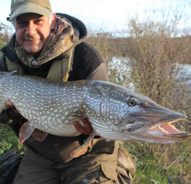If anywhere’s peaceful and has least call for security measures, you might think it’s wherever you can go fishing. But you would be wrong. Dilip Sarkar, a former West Mercia police officer and lifelong angler, was appointed in late 2012 as fishery enforcement manager for the Leominster-based Angling Trust. He writes:
Fisheries enforcement, until now, has been seen as the Environment Agency’s responsibility, but it is not in fact. Poaching – fishing without permission – is a criminal offence, known as Theft of Fishing Rights, under schedule one of the Theft Act. Moreover, fish in enclosed waters are considered property and can be stolen. It is important to appreciate that these are not victimless crimes – but are impacting significantly upon livelihoods. Individual large carp, for example, are worth many thousands of pounds, and the theft of and black market trade in them is a serious issue. Much of this, however, goes unreported to the police – who have a responsibility here – due to a lack of confidence. Indeed, the police are untrained in such matters and anglers are frequently frustrated by inappropriate responses should they report incidents. My appointment as the Angling Trust’s first Fisheries Enforcement Manager, given my policing experience, and the new national focus on Rural Crime (RC), however, is changing this unacceptable scenario.
A key element of the new RC Strategy is to increase confidence in the police and intelligence from the rural area. Including sea anglers there are some 3.5 million anglers in this country, 1.5 million of them freshwater anglers and who cannot be ignored as a valuable source of rural intelligence. Moreover, those responsible for poaching and fish theft are inevitably involved in a much wider range of criminal activity. Both of these points the police now accept – and we are working closely with an increasing number of forces accordingly. For example, I sit on the England and Wales Poaching Priority Group, which includes such stake-holders as the EA, National Farmers’ Union, Countryside Alliance, The Deer Initiative and British Association of Shooting Conservationists – we work closely with the National Wildlife Crime Unit with which we have recently launched Project TRESPASS, which has ACPO support, aimed at encouraging forces to take an interest in, properly understand and mount operations concerning poaching.
My current strategy is three-fold:
1) To educate anglers regarding the intelligence-led system and emphasise the crucial importance of reporting incidents. We are doing this through a media campaign and our Fisheries Enforcement Workshops, which cover law, conflict resolution, risk assessment and health & safety, and delivered in partnership with the Institute of Fisheries Management, the EA and NWCU.
2) Educate police officers regarding the law and their responsibility. Amongst the forces we are working with is West Mercia, with which we are discussing online training for their staff and a command prompt for call takers. Our recently published ‘Elelementary Guide to Angling Law & Fisheries Enforcement’ has recently been uploaded to the Police Online Knowledge Area and is therefore available to all officers nationwide.
3) Encourage formal liaison, intelligence sharing and combined operations between the police and EA. We have a number of such operations being planned already this year and I am liaising with an increasing number of forces. This is also about creating an effective enforcement partnership, with all stakeholders, including the police, EA, CEFAS, DEFRA, various NGOs and other stakeholders being on the same page to facilitate delivery of a cohesive approach.
Approaching people at the waterside is a potentially dangerous business – all anglers, bear in mind, have a legitimate reason to carry a knife and the EA confirm that more of their officers are assaulted when checking rod licences than engaged on any other enforcement activity. Given the volatile and litigious nature of society, angling clubs need to wise up and be more professional in their approach to bailiffing their waters. Again, this is another reason for our workshops and we will soon be issuing best practice guidelines for angling club bailiffs. Certainly the provision of knife-proof covert vests is neither unreasonable or OTT.
There is a problem with Eastern European migrants, whose culture is to fish for the pot and not practise catch and release as we do here, which has caused horrendous problems in certain areas of the country – and much bad feeling. This we are addressing through both practical enforcement and our longer term strategy of education and integration – the ‘Building Bridges’ project.
Pictured: Dilip Sarkar with a 25lb pike caught from the River Wye in December – the fish was returned to the water.
Photo courtesy of Dilip Sarkar. Visit www.dilipsarkarmbe.co.uk.










